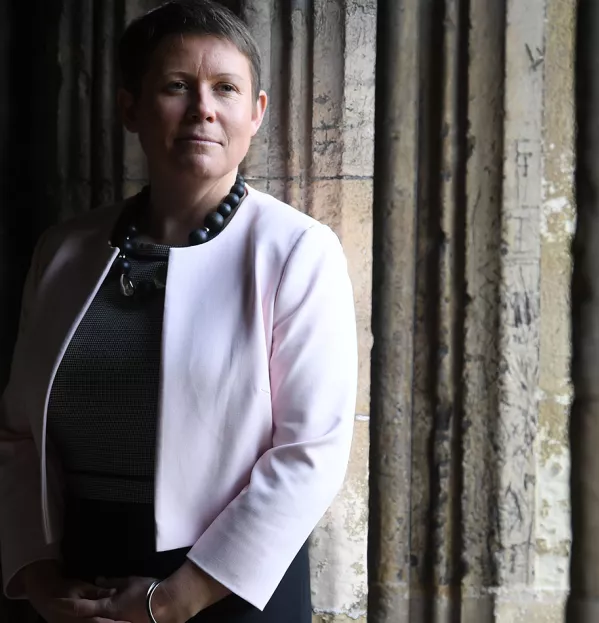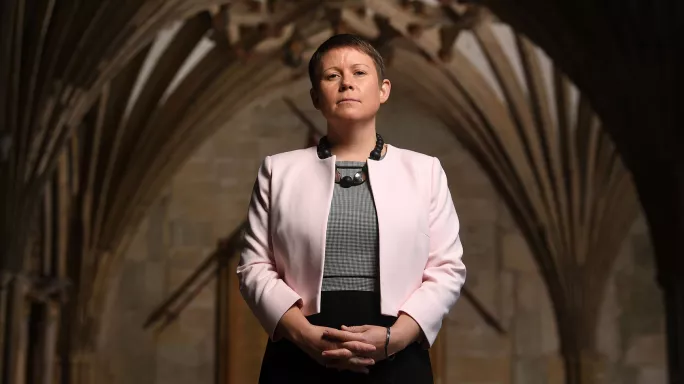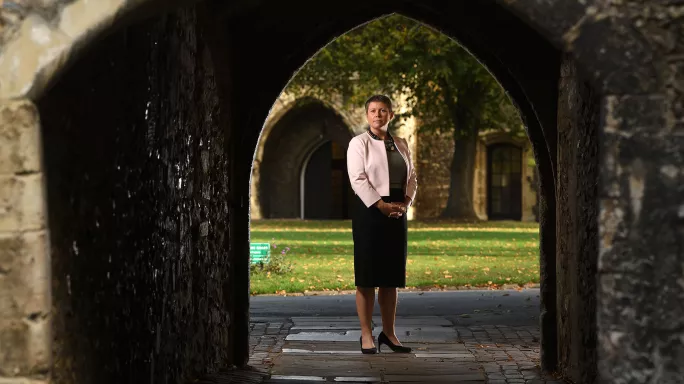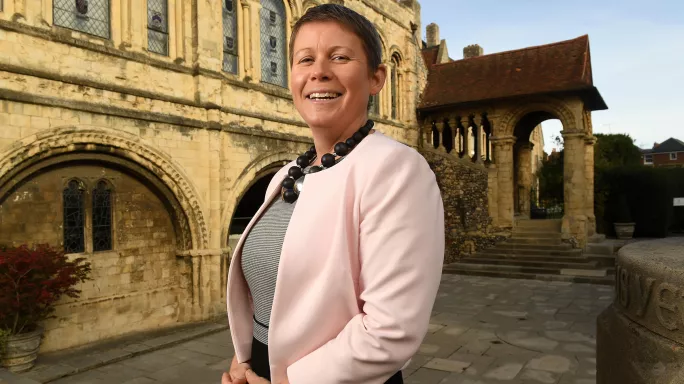- Home
- Leadership
- Staff Management
- 10 questions with...Jude Lowson
10 questions with...Jude Lowson

Jude Lowson is the headmistress of The King’s School in Canterbury, the first female head of the school in its 1,426-year history.
Her appointment is all the more remarkable given that she spent the early part of her career working in advertising for Bartle Bogle Hegarty before retraining as a history teacher in 2010.
She chatted to Tes about her own school days and the teachers who inspired her, why a broader education could benefit pupils, and how leading a school founded in 597 gives you a different approach to decision making.
1. Who was your most memorable teacher and why?
I went to a state school in south-west London but when I was 11 we moved to Brussels, and I went to an international school there for two years.
I came back to board at age 13 to 18, and my boarding house mistress - Arabella Stewart - was my most memorable teacher. She was the most dedicated, selfless, kind teacher I could have wished for.
I learned a lot from her about how to run a place like a boarding house, which needs a degree of rigidity and rules but also compassion and kindness. When you create those conditions, everything else falls into place. I’m still in touch with her now and she came to my wedding.
2. What were the best and worst things about your time at school?
I had a great time at school overall, but the best thing was I went to a school that did the International Baccalaureate. It suited me really well because I liked the breadth of the IB. It kept me doing things I would otherwise have dropped - a foreign language, maths, English.
I think there’s a lot to be said for that. The IB’s philosophy about global-mindedness and preparing to make a positive contribution really spoke to me.

On the worst side, I am quite sporty and while my secondary school was progressive and liberal in many ways, the provision for sports for girls just wasn’t the same as for boys. We couldn’t do girls’ football, cricket was just becoming popular but we only had one girls’ team for the entire school.
It wasn’t really the school’s fault, there just wasn’t that backing behind girls’ sport then.
3. Why do you work in education?
I’m a latecomer to education but once I came to work in schools I was hooked.
I’m an optimist - I always want to see solutions or try to fix things or try to move things forward, and I’m quite restless as well. I like to see how things can be developed. Education is fundamentally about the future, about where you go next, so school is a good place for a restless optimist.
More 10 questions:
- Sir Peter Lampl, founder of the Sutton Trust
- Melanie Renowden, CEO of the National Institute of Teaching
- Emma Hollis, NASBTT executive director
In terms of why I moved into teaching, I’d always toyed with the idea of being a teacher but at university I really got into the idea of working in advertising and that was a really exciting sector.
But my now wife was a teacher and I began to see what she was getting up to and I thought that looked fun and I began to wonder whether what I was doing was as purposeful as teaching.
That led me to Schools Direct and I immediately got a buzz from it; working with pupils, enthusing them about subjects, learning from them and colleagues. You can’t help but feel energised by schools. I’ve never looked back.
4. What are you proudest of in your career?
I’m pretty sure that when I reflect on my career, whenever that is, maybe I’ll feel proud about inspection results or plaudits but I suspect I’ll remember pupils’ stories most and the pride I’ve felt for them; the ones I taught history to and didn’t really appear to be getting on with it but got a fantastic grade because they persevered, or pupils who had suffered illness or bereavement and were still able to come through and succeed.
5. Who would be your colleagues in your perfect school staffroom?
I’ve worked with loads of great people who, if I was going to start a school, I’d probably want to bring together like Avengers Assemble.

Overall, though, what all great colleagues have in common is that they get stuck into all aspects of school life, support whatever it is the school is trying to do, are endlessly patient and never give up on pupils.
They also remember that it’s meant to be fun - of course, we’re pursuing outcomes but school and learning is meant to be enjoyable.
6. What are the best and worst aspects of our school system?
There’s lots that has improved in schools in my time - pupil mental health and wellbeing is not taboo to talk about any more and we are much better at supporting that. Alongside that are better safeguarding practices and a better understanding of educational needs and neurodiversity.
However, education is still quite rigid. There are people for whom GCSEs just doesn’t quite work. I also think there’s room for more breadth in what we do and finding other ways to assess that do not rely so much on a heavy diet of terminal examinations so early on in a pupil’s career.
I suppose the flip side of that debate, though, is that, as a school leader, the sands are shifting all the time. With each government you get a slightly different education policy. That lack of stability is definitely something of a challenge.
7. Who in education has influenced you the most?
I’m not sure there’s one single huge, profound thing I’ve taken from one person, but what’s great about schools is you are learning all the time. There are lots of things I have magpied from many colleagues in schools that have added to my knowledge, experience and approach to education.
I think we should always be open to looking at what other schools are doing and learning from other ideas and ways of working, and thinking, “How do we apply that here?”
8. If you became education secretary tomorrow, what would be the first thing you’d do?
I think education being part of that political cycle is a real downside because it becomes part of that battleground. So I suppose what I would do is resign as an MP and reform the Department for Education and find a way for it to be much more bipartisan and linked to schools.

So for instance, I would want to focus on the things heads are really worrying about right now: the facilities and buildings being safe and, perhaps most importantly, ensuring that the career of being a teacher is highly regarded and highly rewarded.
There is a genuine existential threat from the difficulty of recruiting teachers in certain subjects, and if we can’t get on top of that then we can design the best curriculum in the world but with nobody to teach it or inspire pupils, that’s going to be meaningless.
9. What will schools be like in 30 years’ time?
There’s been education happening on this site for over 1,400 years, so 30 years is a heartbeat!
As a leader of this school it does mean you’re conscious of the fact you’re part of quite a long journey but while it’s a cliché, we are in a time of profound change and I think the pandemic accelerated the pace of change and gave us a nudge towards a more technologically-driven vision of education.
Artificial intelligence is the next shot in the arm, but my take is we have to double down on our humanity - we have to hold on to the value of teaching great literature, poetry, art, the scientific method, mathematical inquiry - doing all the things AI can imitate but not invent.
Of course, it’s important pupils have the skills to thrive in a world that is going to be technologically more complex. But alongside that they will need their humanity - creativity, imagination, empathy, understanding and so on.
10. What are the most important lessons you’ve learned from doing this job?
I’ve only been doing this job for two-and-a-half weeks so I’m mostly learning about my school, but the thing that has hit me is I am just one of a long line of people who’ve had this position over 1,400 years.
It does make you reflect on the fact that education is a really long-term game and the importance of having a long horizon and asking how I can help the school to be in the best position possible - not just next year but five years into the future and even 1,000 years into the future.
What decisions might I make now? And how will those change what the school is like but also how pupils’ lives will grow and develop? We set the pattern in schools for what happens in pupils’ lives.
Jude Lowson was talking with Dan Worth
You need a Tes subscription to read this article
Subscribe now to read this article and get other subscriber-only content:
- Unlimited access to all Tes magazine content
- Exclusive subscriber-only stories
- Award-winning email newsletters
Already a subscriber? Log in
You need a subscription to read this article
Subscribe now to read this article and get other subscriber-only content, including:
- Unlimited access to all Tes magazine content
- Exclusive subscriber-only stories
- Award-winning email newsletters
topics in this article



